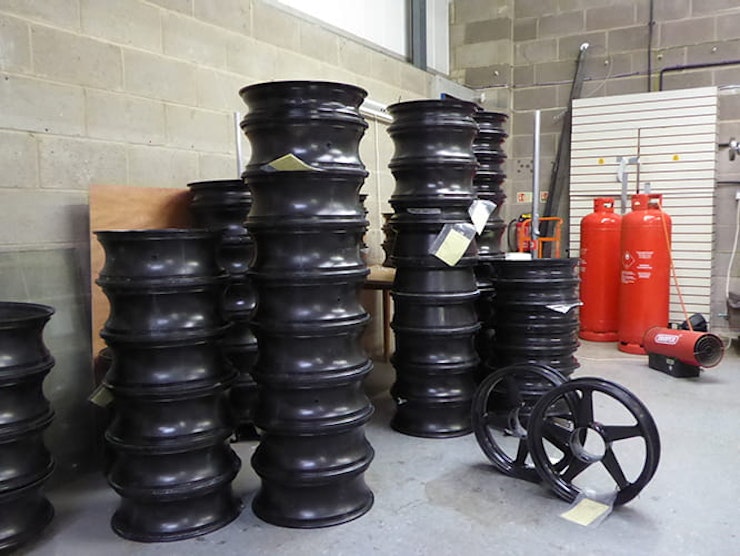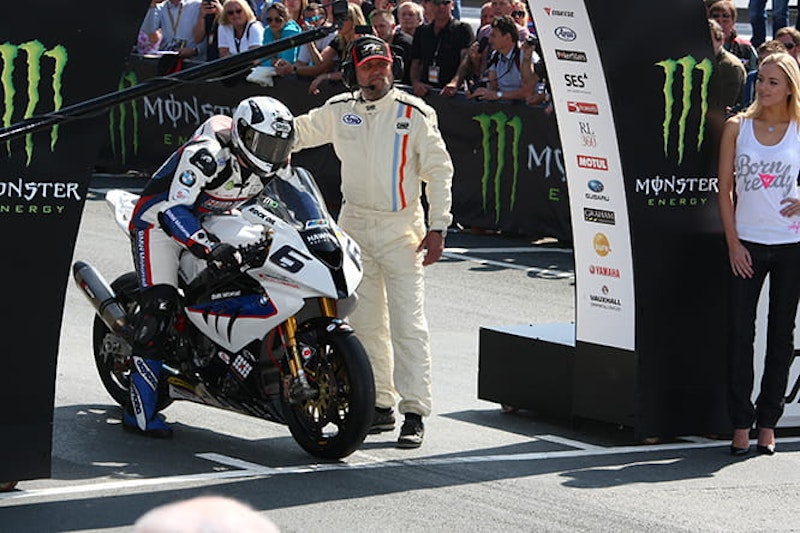Author: Jim Lindsay Posted: 22 Jun 2016
In the sixth of our series looking behind the scenes of the British motorcycle industry, Bike Social visits the rapidly expanding Wiltshire base of wheel manufacturer, Dymag.
Dymag was started 40 years ago by engineer Max Bostrom, who had been making alloy wheels since the mid 1970s. Their history is enviable. They still have the drawings for the wheels they supplied to Barry Sheene. Eddie Lawson won the 1984 500cc world championship on Dymags. Joey Dunlop won TTs on them, as did David Jefferies and Steve Hislop.
On four wheels, Nigel Mansell won the 1993 Indy Car championship using Dymags. Dymag also supplied most UK-based Formula 1 teams. Their wheels were used by Mansell, Ayrton Senna and Alain Prost, among others.
In 1995, Chief Engineer Mike Wilson, who has been at Dymag all his working life, designed the world's first all carbon fibre motorcycle wheel.
Right now, backed by £7.2m of Government grants and loans, Dymag are working closely with Bristol based National Composites Centre, developing a high volume manufacturing process which will allow them to produce up to 200,000 composite wheels a year by 2020.
At present, Dymag carbon wheels are each hand built with each wheel taking 8 man hours. The quality is superb but the production cost is high and the profit margin relatively tight.
Most mass produced composite products are made using autoclave technology, which is expensive, slow and capital intensive. Dymag are using the newer, more efficient method of Resin Transfer Moulding. Highly skilled handwork is still involved, but when the process is refined, they will be able to produce a complete wheel in minutes, not hours while also enhancing the already high levels of consistency and quality offered by the hand made wheels.
They will be opening subsidiaries in the USA and also in Japan, where enthusiasts spend small fortunes building some of the world’s most well thought out specials. The UK dealer network is set to expand from the current two distributors to a total of 65 dealers.
In 2013, forged magnesium wheels were banned from World Superbikes to reduce costs. British Superbikes and the IoM TT soon followed. In 2014, following these rule changes, Dymag returned to the sport in which they had established their reputation many years before. Michael Dunlop used a new forged Aluminum wheel on his BMW S1000RR that year as he notched up four more TT wins.
In 2016, they are the main sponsors of the Golden Era Superbike Championship, part of the Thundersport GB series. At this year’s TT, Michael Dunlop, James Hillier, Dan Kneen, Martin Jessop and many others ran with Dymags while in BSB four teams use them.
Dymag are confident that composite wheels will make a return both to Superbike and MotoGP racing in the future and they are also looking at becoming OEM (Original Equipment Manufacturer) suppliers to both motorcycle and car manufacturers. There is previous form here, as Dymag have supplied wheels as original equipment to both KTM and Ducati Performance for top of the range models.
Dymag hold a specifications database covering over 3,000 bikes stretching back to the early 1980s. They add new models to the list all the time. The modular nature of the construction makes it a straightforward matter to finish an alloy or composite wheel to fit any motorcycle.
This is high value engineering at its best but it could all have turned out differently had it not been for the enthusiasm and energy of current owner Chris Shelley and the dedicated team with which he has surrounded himself.
Chris had been involved in Dymag between 1993 and 2007, but left the company when his partners rejected an external investment offer which he felt was essential for continued growth. “They also took their eye off the motorcycle wheel side of the business,” Chris told Bike Social. The company was concentrating too much on car wheels whereas it was the motorcycle wheels which were making money. In 2009, the then owner Yoshi Takei was forced to close the company. The future looked bleak until “on a whim,” as he says, Chris Shelley bought the company's assets and set about rebuilding.
“Before I bought it, Chris said, “I had to make sure I could get the four key people I needed to come back to Dymag. These were Chief Engineer, Mike Wilson, machinist Andrew Moore, carbon fabricator Craig Butler and Production Foreman, Simon Hardisty whose fanatical attention to detail makes sure that nothing leaves the premises without being 100 per cent fit for purpose.
“I knew I had to have these key people with me if I was going to make it work,” says Chris.
When I first visited Dymag in 2011, they were working in two small units with just four people. Now the company occupies five units, with a sixth about to come on stream. The number of employees has risen to 19 and will rise further.
The Chairman of the Dymag Board is Bob Dover, an engineer who was formerly CEO of Jaguar/Land Rover and who adds commercial clout to the firm.
Chris Shelley turned his back on a successful corporate engineering career to pursue his passion for British manufacturing at Dymag. He has put a lot of his own money in and continues to invest in equipment. A high-spec, five axis, computer numerically controlled (CNC) milling machine is due to arrive soon which means that they will be able to bring machining work which is currently carried out overseas back in-house.
I spent several fascinating hours touring the factory. The wheels themselves are things of beauty. The enthusiasm of the whole team is infectious. They are rightly proud of the things they make.
The levels of innovation and commitment at Dymag are an inspiration. We'll be back next year to report on their progress.
USEFUL LINKS
www.nccuk.com (National Composites Centre, Bristol)
https://hvm.catapult.org.uk/technologies - government backed initiative to promote high value manufacturing in the UK
MORE FROM THE 'INSIDE THE BRITISH MOTORCYCLE INDUSTRY' SERIES
Share on social media:

